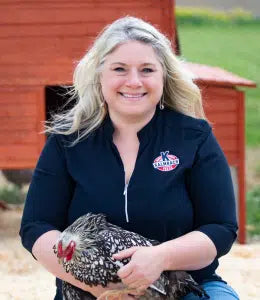Proven Ways to Help Your Chickens Lay More Eggs

Have you ever wondered if it’s possible to help your laying chickens produce more eggs? The answer to that question isn’t as black and white as you may think. Yes, there are management practices and feed choices that can help your birds maximize their genetic potential. However, there is no magic button that turns on egg production. A combination of strategies is the best way to make sure your girls are laying at a rate that works for you and works for them!
#1 – Quality Feed
A high-quality complete layer feed is the absolute best way that you can help your chickens lay more eggs. A great chicken feed is essential to keeping your birds in peak physical condition so that they can produce beautiful, wholesome eggs for you and your family. The physiological process of producing eggs zaps a lot of nutrients from a hen’s body and it’s important to replenish those nutrients through her feed. Multiple vitamins, minerals, and other nutrients are required for proper egg production and if your hens are not receiving the proper amount of those nutrients, egg production will suffer.
When evaluating the best feed options for your flock, look for high-quality feed. High-quality chicken feeds have a well-rounded nutrient profile. This means that the feed inside that bag contains all of the nutrients, in the correct proportions, that your birds need to stay healthy and productive all year long – even during the hottest of summers and the darkest of winters! Another advantage that you may want to consider is a feed that is fixed formulated. Fixed formulation means that the ingredients AND THE NUTRIENTS in that bag do not change on a regular basis. This consistency in nutrition helps your birds lay eggs at their peak potential.
Remember, most animals use their nutrients in three different ways – 1. Growth; 2. Maintenance; and 3. Production. If an animal is nutrient deficient (or stressed!), the first thing she will sacrifice is egg production. Keeping a high-quality layer feed, such as our Henhouse Reserve® or All Natural 17% Layer, available for your hens at all times is the #1 way to help them lay more eggs. If you need help finding the right feed for you, check out our quiz at the bottom of our What to Feed Laying Hens article.
#2 – Genetics
We can do lots of amazing things with nutrition, but we can’t overcome genetics. Certain breeds of chickens and ducks have been genetically selected to be excellent egg producers. Examples would include White and Brown Leghorns, Rhode Island Reds, and many of the new crosses that use these high-producing genetics. If egg production is one of your primary goals, look for breeds that are high or very high egg producers when adding new birds for your flock.
Age is also a really important factor to consider when helping your chickens lay more eggs. It is very common for older hens (3+ years) to take longer breaks between eggs or to have longer molts. It doesn’t necessarily mean there is anything wrong with how you are feeding or housing your hens. It’s just a natural progression in the life and the productivity of older birds. Adding new birds to your flock every 1-2 years is a great way to ensure that you have more consistent egg production throughout the year.
#3 – Light
Egg production is light sensitive. A hen needs between 14-18 hours of light per day to stay at peak egg production. This is a primal instinct that relates directly to spring and summer seasons when resources are plentiful and the odds of successfully raising baby chicks are high. Chickens have a sensory organ in their brain that is directly linked to the hormones that trigger egg formation. This sensory organ is stimulated by light and dark periods during the day. If you want to keep your hens producing during the fall and winter, add supplemental light so that your hens receive about 16-18 hours of “daylight” per day.
#4 – Reduce Stress
Reducing stress is an excellent way to help your chickens lay more eggs. Most animals use their nutrients in three different ways – 1. Growth; 2. Maintenance; and 3. Production. If an animal is stressed, they will spend more of their energy and nutrients fighting that stress. Any energy they use fighting stress comes directly away from the nutrients they need for egg production.
Sources of stress for your chickens could include health challenges, cold or heat stress, or environmental stressors, like overzealous roosters or mean coop mates. Reducing these challenges for your chickens frees all of that extra energy to be used for egg production. Making sure your birds have a clean, safe coop that is free of drafts can help reduce health challenges and reduce cold stress. Keeping the proper hen to rooster ratio (10 hens to 1 rooster) and removing mean hens from your flock can help reduce environmental stressors. Also, look for a Kalmbach® layer feed that contains LifeGuard®. LifeGuard® is a proprietary blend of ingredients that helps your birds maximize gut health, while, in turn, directly improving their immune system and their ability to fight health challenges. LifeGuard® also contains a specific blend of essential oils that are powerful antioxidants and can help your birds naturally combat the negative effects of stress.
Stay tuned! We are so excited to continue writing about all the topics that are important to you. Keeping poultry is such a wonderful experience and the rewards are many! At Kalmbach Feeds®, we love our chickens, and we are always here to help. If you have any questions about the nutrient needs of your birds, feed options, or general poultry keeping, please let us know.
